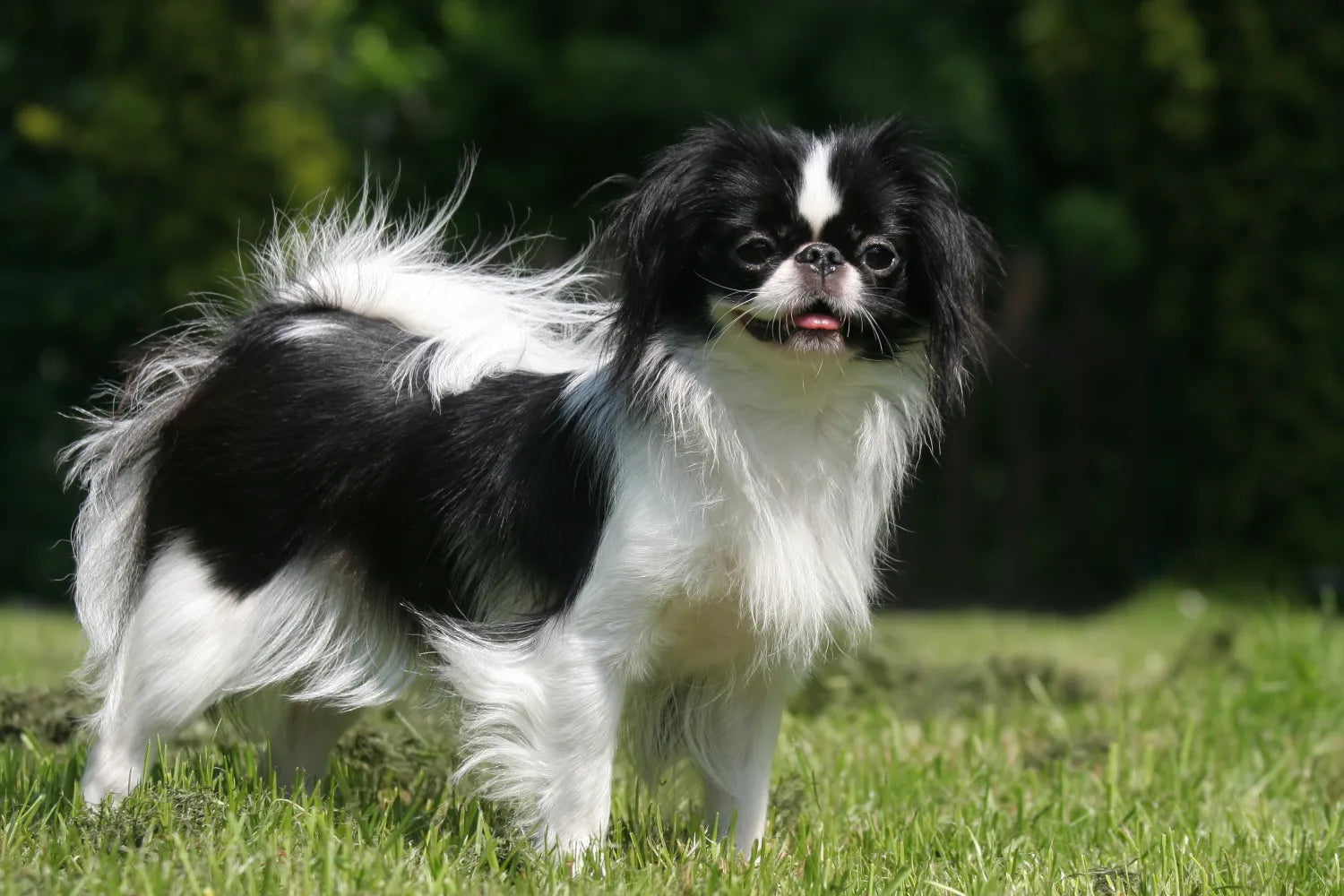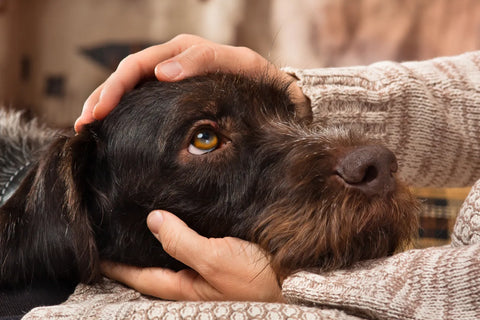
Japanese Chin Breed Basics
Dive into the world of the Japanese Chin, a delightful little dog with a big personality. These small, elegant pooches are renowned for their unique appearance, plush, silky coats, perceptive eyes, and charming and affectionate demeanor.
Originating from Japan, this breed has a fascinating history, having started as the treasured companion of nobility before finding its way into the hearts of families across the globe, including America and England.
Here at A Pup Above, we're all about embracing the joy and uniqueness each dog breed brings, and the Japanese Chin, with its mix of regal grace and playful charm, is no exception.
Let's embark on an exploration of this captivating breed that's as much a treat for the eyes as it is for the heart.
THE ORIGIN AND HISTORY OF THE JAPANESE CHIN
The Japanese Chin's story is steeped in history and elegance. These dogs were originally bred for companionship in the Japanese imperial courts, where their graceful demeanor and affectionate nature made them favorites among nobles. Far from just being a pet, the Japanese Chin was a symbol of royalty and luxury in Japanese culture.
Their journey to Western recognition is a tale of intrigue and admiration. The breed was introduced to America and England, where it distinguished itself from other Asian toy breeds, like the Chinese Pekingese, with its distinct heritage and charming characteristics. This transition from the lap of Japanese luxury to beloved family pets around the world is a testament to their enduring appeal and adaptability.
WHAT ARE THE JAPANESE CHIN’S CHARACTERISTICS?
The Japanese Chin is a breed that captivates at first glance, boasting a number of distinctive physical traits:
- Head and Eyes: They feature a broad head with large, expressive eyes, giving them an almost human-like, perceptive look.
- Coat and Feathering: Their coat is luxurious and silky, complete with elegant feathering on the ears, legs, tail, and feet, adding to their sophisticated appearance.
- Color Palette: Available in a variety of colors, including sable and tan points, they offer a stunning visual diversity.
- Movement: Their movement is light and graceful, akin to a cat's, reflecting their agile and poised nature.
WHAT IS THE TEMPERAMENT OF THE JAPANESE CHIN?
The Japanese Chin is more than just a pretty face — it's a dog with a personality that's as rich and delightful as its elegant appearance. These dogs are renowned for their affectionate and companionable nature, often forming deep bonds with their family members.
Here's what sets them apart:
- Affectionate and Loving: They are known for their deep affection and love of cuddling, often becoming closely attached to their owners.
- Cat-Like Characteristics: The Japanese Chin exhibits several cat-like traits, such as a love for high perches, gracefulness in movement, and a certain level of independence.
- Sociable Nature: They generally get along well with other pets and people, making them excellent family dogs. Their friendly demeanor makes them adaptable to various households.
- Need for Socialization: While naturally sociable, early and consistent socialization is important to develop a well-rounded temperament. They respond well to gentle, positive interactions.
Understanding and appreciating their unique personality traits ensures that Japanese Chins thrive in their environments, bringing joy and elegance to their human companions.
HOW DO I CARE FOR A JAPANESE CHIN?
Caring for a Japanese Chin involves understanding their specific health and grooming needs. Being aware of these can help ensure a long, happy life for these charming companions:
HEALTH CONCERNS
Common health issues in Japanese Chins include:
- Brachycephalic Syndrome: Due to their distinctive facial structure, they may experience respiratory issues. Monitoring their breathing and avoiding strenuous exercise, especially in hot weather, is essential.
- Heart Health: Monitoring for heart murmurs, a condition some may inherit, is crucial. Regular veterinary check-ups can help in early detection and management.
- Joint Health: Patella luxation is a concern in this breed. Keeping them at a healthy weight helps reduce stress on their joints.
GROOMING NEEDS
The Japanese Chin’s silky coat is one of its most striking features, requiring regular grooming to maintain its elegant appearance. Frequent, gentle brushing prevents matting and keeps their coat healthy and shiny. Bathing should be done with products suited for their delicate skin to maintain the coat’s natural luster.
EYE CARE
A Japanese Chin's enchanting, wide-set eyes are one of their most endearing features, but they also require special attention. Regular veterinary eye exams are vital to monitor for conditions like cataracts, which can be common in the breed. Early detection and treatment can help maintain your Chin’s eye health, ensuring they continue to see the world with clarity.
EXERCISE NEEDS
While the Japanese Chin is not a highly energetic breed, they still benefit from regular, gentle exercise. Short daily walks and playful interactions help keep them physically fit and mentally stimulated.
It’s important to balance their exercise routine with their brachycephalic nature, ensuring they don’t overexert themselves. Mental stimulation can be just as important, with activities like puzzle toys, quizzes, or gentle training sessions keeping their minds active and engaged.
DIET AND NUTRITION
Nutrition is key for the Japanese Chin's health and happiness. At A Pup Above, we understand this and offer a range of freshly cooked meals that are both palatable and nutritious. Our human-grade ingredients are carefully selected to provide the balanced diet these charming dogs need.
With every bite of our sous-vide-cooked meals, your Japanese Chin gets the right mix of proteins, vitamins, and minerals, ensuring they stay as lively and graceful as ever.
Japanese Chin Feeding Chart
Now that you understand how crucial a balanced, nutrient-rich diet is for your Japanese Chin's vibrancy and grace, let's dive deeper into exactly what and how much to feed them at different stages of their life. This step-by-step feeding chart will help ensure your furry friend enjoys every meal as much as they enjoy snuggling up with you.
Feeding Guide by Life Stage:
- Puppies (under 1 year): These tiny dynamos need extra nutrients to fuel their growth. Choose a high-quality puppy food — whether that’s kibble, wet, or fresh food — that's rich in proteins, vitamins, carbohydrates, and essential fatty acids to support their development and the silky growth of their distinctive coat. A dash of blueberries, as suggested in our "What Vegetables are Good for Dogs?" guide, can be a fun and hydrating treat full of antioxidants.
Amount of Food: Generally, a Japanese Chin puppy should eat about ¼ to ⅓ cup of food per meal, served three to four times daily, based on their individual energy levels and body weight.
- Adults (1-8 years): As they mature, your Chin will need a well-balanced adult dog food that maintains their energy while keeping them at a healthy weight. Ensure the food is high in quality protein and devoid of unnecessary fillers. Incorporating wet food can aid hydration, aligning with insights from "Keep Your Dog’s Hydration Top-of-Mind for Healthy Fun."
How Much To Feed: An adult Japanese Chin typically thrives on ½ to ¾ cup of food daily, split into two meals to support their digestive health and sustain energy.
- Seniors (over 8 years): Aging Chins require specially formulated diets that consider their slowing metabolism and potential joint issues. Look for foods that include joint-supporting supplements like glucosamine and are lower in calories but still nutritionally rich.
Feeding Amounts: Adjust their portions to slightly less than what adults receive, and consider softer food options like wet food or well-cooked brown rice to ease chewing.
PRACTICAL TIPS FOR JAPANESE CHIN CARE
Caring for a Japanese Chin is a delightful experience, and here are some tips to ensure your furry friend stays healthy and happy:
- Selecting a Breeder: If you're considering adding a Japanese Chin puppy to your family, choosing a reputable breeder is crucial. Look for breeders who prioritize health, temperament, and adherence to breed standards.
- Socialization and Training: Early socialization and consistent, gentle training are key. Despite their sometimes independent nature, Japanese Chins respond well to positive reinforcement and enjoy interactive training sessions.
- Creating a Comfortable Environment: These dogs cherish their comfort, so ensure they have a cozy spot to relax and sleep. They often enjoy perching on high places, so consider safe, elevated spaces where they can observe their surroundings.
- Fresh, Nutritious Meals: For your Japanese Chin's diet, consider fresh dog food options like Chicka Chicka Bow Wow and Porky's Luau. Our human-grade, sous-vide meals ensure a balanced diet full of essential nutrients for your pet's health and happiness.
- Addressing Separation Anxiety: Japanese Chins can be prone to separation anxiety. Establish a routine that includes quality time and reassure them of your return when you leave.
- Preventive Healthcare: Regular veterinary check-ups, including monitoring for breed-specific health issues like heart murmurs and patella problems, are vital for their long-term health.
A FINAL WORD
The Japanese Chin is not just a companion dog but a symbol of love and elegance. These small dogs, with their lap dog charm and affectionate demeanor, make some of the best companions for those who appreciate a blend of regality and playfulness.
At A Pup Above, we recognize the uniqueness of every breed, and the Japanese Chin is no exception. Their cat-like agility, coupled with a need for gentle dog training, makes them a joy to have as part of the family.
A good dog in every sense, the Japanese Chin thrives with proper care, from a diet of nutritious meals to regular health check-ups and social interactions. Embracing their needs means embracing a life filled with joy, cuddles, and the unmatched companionship these wonderful dogs offer.
Sources:
Japanese Chin History: Japan's Royal Spaniel | American Kennel Club
Japanese Chin Dog Breed Information | AKC
Canine cataracts | Cornell University College of Veterinary Medicine
Fun, Cognitive Training Games to Make Your Dog Smarter | AKC
Top Stories

Why Do Dogs Lick Their Paws?

Why Do Dogs Whimper & Make Noises in Their Sleep?

Healthy Vet-Approved Homemade Dog Food Recipes

How To Cook Sweet Potatoes for Dogs






















